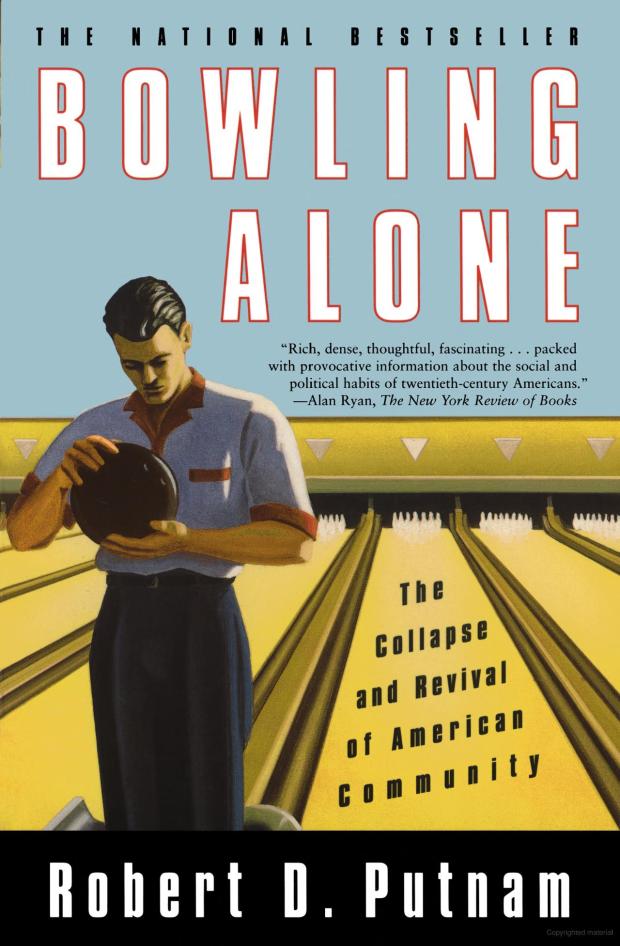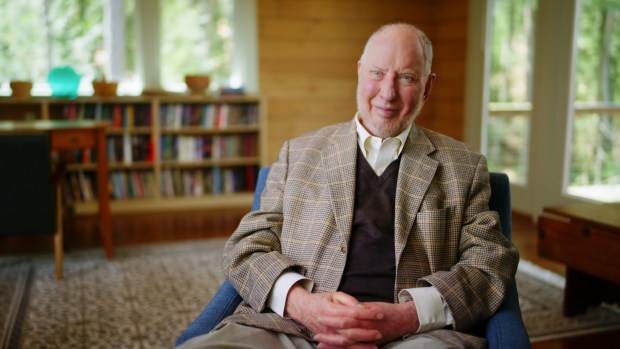“This is a film about why you should join a club,” says director Pete Davis in the documentary “Join or Die,” which he made with his sister, the filmmaker Rebecca Davis. It recently became available on Netflix and feels suited to the moment.
If you’ve been feeling depleted and disconnected from a world of diminished meaningful in-person interactions, “Join or Die” explores one reason why, as laid out by social scientist Robert Putnam. Collectively, we’re less involved in organized gatherings. There are all kinds of reasons for that, but it’s a fundamental shift that’s affected our quality of life, because the social bonds that result when you join a club or organization are not just a matter of “warm, cuddly feelings,” Putnam says in the film. “In area after area of our community life, our communities don’t work as well when we’re not connected.” And that, he says, has far-reaching effects not only on us as individuals, but on democracy itself.
Putnam started formulating his ideas while working as a researcher in Italy early in his career. In regions he describes as “uncivic,” he found that people view public affairs as “the business of somebody else — the bosses, the politicians — but not me. Engagement in social and cultural associations is meager. Corruption is widely regarded as the norm, even by the politicians themselves, and they are cynical about democratic principles. Trapped in these interlocking vicious circles, nearly everyone feels powerless, exploited and unhappy.” And that trickles out to the systems meant to serve a population: “All things considered, it is hardly surprising that representative government here is less effective than in more civic communities.”
Best known for his book “Bowling Alone: The Collapse and Revival of American Community,” published nearly 25 years ago, Putnam comes across as a perpetual optimist and that quality buoys much of the film.
“American doesn’t have to be the kind of America you’ve lived in your whole life,” he says. “I want America to change. I want America to get better.” Even when he’s comparing trends from the 20th century to today, he’s not saying the old days were better, just that participation in clubs used to be more prevalent. “The thing that has actually most concerned me about the debate about ‘Bowling Alone’ is that some people thought I was saying life was much nicer back in the ’50s — ‘Would all women please report to the kitchen’ — and that’s not what I’m saying.”
Pete Davis took one of Putnam’s classes in college in 2010, which is how they met: “Back then,” Pete says, “most of us were feeling pretty good about where America was heading.”
That’s not how I remember it. Two years out from a major recession? The year the Supreme Court handed down its pivotal Citizens United ruling? The year of the Deepwater Horizon oil spill? I don’t know that “most of us were feeling pretty good about where America was heading,” but more importantly, it’s not relevant to the film’s larger points. The documentary improves significantly when Peter takes the focus off himself and talks, simply and plainly, with Putman and others about why any of this matters.
Putnam’s thesis is that communal activities build social ties, which have value beyond the immediate satisfaction of just doing things together. It creates a sense of mutual obligation.
I was thinking about some of these ideas as I was reading an article in the Chicago Reader about dog owners letting their pets run off-leash in city parks. Technically it’s not allowed and the practice can be controversial, but the story focused on an aspect I hadn’t considered: “While proximity and green space may have motivated people to start utilizing unofficial areas, the community that forms within is what keeps them coming back.”
This is more or less Putnam’s theory come to life. According to the story, because of the “community-oriented and unregulated nature of the unofficial dog parks, their patrons feel that they look out for each other’s dogs more than people do when at an official (dog-friendly area). The sentiment that ‘we all look out for one another’ was repeated more times than I could count, whether in the context of cleaning up after dogs, calling dogs that run outside the gates and/or begin to wander off and explore new scents, or maintaining space for other park patrons.”
Putnam puts it this way: “The reason social networks are important is that they mean that if you cheat somebody, other people will hear about it. The more I lose by cheating, the more likely I am to be honest. That leads to the core idea of reciprocity: I won’t cheat you if you don’t cheat me.”
And that, he says, fosters a sense of generalized reciprocity: “I’m going to be nice to you just because you’re in this community and you’re likely to be nice to me. That’s a huge deal. If you can have generalized reciprocity in a community, that community can be enormously more productive because they don’t have to be constantly checking up on one another — I’ll do something for you without expecting something right back because down the road, somebody will do something for me. And anyhow, we’ll always see each other at choral practice. Social capital produces trust and that trust produces lots of good things.”

Political scientist Hahrie Han says those effects extend out: “Most political scientists think of politics as being a function of the effectiveness of our political institutions — Congress, Supreme Court, presidency — and Putnam said it’s also about the way people are connected to each other.”
There is no mention of health concerns related to COVID-19. I don’t know how we have a serious conversation about the value of in-person gatherings if it’s considered acceptable for people to continually get sick. Nor does the film touch on concerns that some organizations, religious or secular, can become places that protect abusers and allow that harm to continue unabated.
But Putnam’s broader ideas resonate.
He’s referring to everything from fraternal lodges to bowling teams, but also informal get-togethers, and looked at data collected by advertisers about how often people attended dinner parties. “The kind of connections that were involved in having friends over to the house, those had benefits.” He calls them “micro opportunities to talk with other people about shared interests in your community, and that’s the kind of thing that’s disappearing.”
Unions are another type of club where people learn negotiating skills and how to advocate for one another. And that, Putnam says, can spill over into how people approach things like town meetings. “I’m not saying unions are flawless, but from a social capital point of view, it would be good if we had stronger unions.”
As a critic, I’ve written about the conspicuous absence of union stories in TV and film over the last few years, despite an increase in unionized workplaces; the number of newly formed labor unions more than doubled nationwide in 2022. The media we consume isn’t just entertainment. It seeps into our subconscious and shapes the way we think about the world — but also the way we think about what’s possible. I suspect captains of industry would prefer the vast majority of us assume the status quo is immovable. Might as well give in, give up and isolate from one another some more.
In “Join or Die,” labor organizer Jane McAlevey offers a similar sentiment: “I believe a deliberate strategy of cultivating individualism begins in the early 1970s to roll back the gains of the civil rights movement, the women’s movement and the trade union movement with a strategy of downgrading the concept of the communal and the collective and elevating the idea that the individual is supreme.
“This wasn’t accidental,” she adds.
Putnam says TV is one of the reasons we’re fractured. He calls it “lethal for social connectedness — basically we’re now watching ‘Friends’ instead of having friends.” But I think it goes even deeper. The kind of stories we see on TV reinforce many of the factors he’s citing. Instead of stories rooted in the idea that life is a group project, we’re fed the message that fixing or changing anything is, as Putnam put it, “the business of somebody else” — and on screen that’s usually the police or superheroes, rather than regular people working together to solve problems.
Do we recognize ourselves in these stories? The novelist Brandon Taylor recently made the observation that, right now, characters in novels by American writers don’t have any friends. “Our characters and, by extension, our novels are so vastly lonely. No one is hanging out! No one is really engaging in friendship.”
“Join or Die” invites us to think through the larger implications of that. Or as Putnam says: “What kind of America will I have allowed to happen or pushed to have happened?”
“Join or Die” — 3 stars (out of 4)
Where to watch: Netflix
Nina Metz is a Tribune critic.




